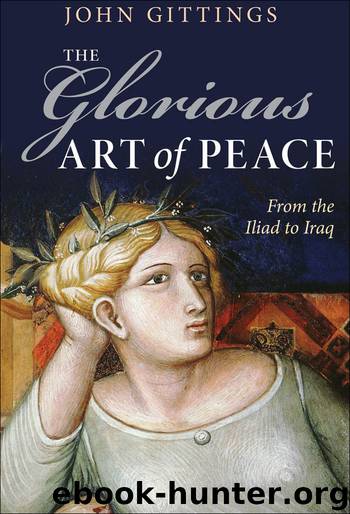The Glorious Art of Peace by Gittings John

Author:Gittings, John
Language: eng
Format: epub
Publisher: OUP Oxford
Published: 2012-02-29T16:00:00+00:00
The First World War presents historians of peace and war with a bitter paradox. In the preceding decades the demand for peace had been internationalized on an entirely new scale, with vocal support ranging from citizens to national leaders. The decade leading up to 1914, writes M. S. Anderson in his textbook on European history, ‘probably saw a more widespread belief in the possibility of international cooperation and a more general optimism as to the possibility of achieving permanent peace between the great powers than had ever been known before’ (and, we might add, than has ever been known since).1 According to the military historian Michael Howard, ‘the abolition of war, that dream of the eighteenth-century philosophers, seemed almost within reach’ for many peace advocates.2 The peace movement reached ‘the apogee of its public influence and support in the years immediately preceding World War I’, suggests the peace historian David Cortright.3 In 1908, the Universal Peace Congress in London was given a reception by the king and a dinner with the prime minister: can one imagine a similar event taking place today? And yet one is driven to the conclusion, as A. C. F. Beales wrote much closer to the time, that ‘The bitter tragedy of the years that followed the Hague Conference lies in that the idea of World Peace was becoming more practically futile as it grew more theoretically axiomatic. Though the ranks of the world’s Peace crusaders had broadened out from the older critics of the War system … the Movement was quite incompatible with the existing system of international relations.’4 A more recent historian of this period (Sandi Cooper) puts it succinctly: the international movement ‘reached its apogee in the same years that the arms race spiralled across Europe (1889–1914)’.5
What should we conclude from this ‘incompatible’ juxtaposition of a blossoming peace movement and a burgeoning arms race. Sceptical commentators such as Michael Howard write off the efforts of the movement as practically futile in the face of the grinding momentum towards war, and as theoretically blind to the true dangers arising from ‘the forces inherent in the states-system of the balance of power which they had for so long denounced, and those new forces of militant nationalism which they themselves had done so much to encourage’.6 In this view, the ‘great illusion’ of which the British peace advocate Norman Angell wrote in his popular book with that title (1912) was not, as he argued, that war destroys the basis for economic prosperity in an integrated world and is therefore an anachronism.7 The ‘illusion’, say the sceptics, was that the driving forces of nationalism and of arms competition could somehow be restrained by rational persuasion and moral appeal. Stated in more moderate terms, there is some truth in the charge of wishful thinking—of which Angell himself was aware. Commenting sarcastically in 1913 on the build-up to war, he observed: ‘I have spoken of Pacifists and Bellicists but, of course, we are all Pacifists now. … all the Chancelleries of Europe alike declare that their one object is the maintenance of peace.
Download
This site does not store any files on its server. We only index and link to content provided by other sites. Please contact the content providers to delete copyright contents if any and email us, we'll remove relevant links or contents immediately.
| Automotive | Engineering |
| Transportation |
Whiskies Galore by Ian Buxton(41984)
Introduction to Aircraft Design (Cambridge Aerospace Series) by John P. Fielding(33115)
Small Unmanned Fixed-wing Aircraft Design by Andrew J. Keane Andras Sobester James P. Scanlan & András Sóbester & James P. Scanlan(32788)
Craft Beer for the Homebrewer by Michael Agnew(18234)
Turbulence by E. J. Noyes(8040)
The Complete Stick Figure Physics Tutorials by Allen Sarah(7362)
Kaplan MCAT General Chemistry Review by Kaplan(6925)
The Thirst by Nesbo Jo(6925)
Bad Blood by John Carreyrou(6610)
Modelling of Convective Heat and Mass Transfer in Rotating Flows by Igor V. Shevchuk(6431)
Learning SQL by Alan Beaulieu(6277)
Weapons of Math Destruction by Cathy O'Neil(6263)
Man-made Catastrophes and Risk Information Concealment by Dmitry Chernov & Didier Sornette(6001)
Digital Minimalism by Cal Newport;(5747)
Life 3.0: Being Human in the Age of Artificial Intelligence by Tegmark Max(5543)
iGen by Jean M. Twenge(5408)
Secrets of Antigravity Propulsion: Tesla, UFOs, and Classified Aerospace Technology by Ph.D. Paul A. Laviolette(5364)
Design of Trajectory Optimization Approach for Space Maneuver Vehicle Skip Entry Problems by Runqi Chai & Al Savvaris & Antonios Tsourdos & Senchun Chai(5062)
Pale Blue Dot by Carl Sagan(4995)
